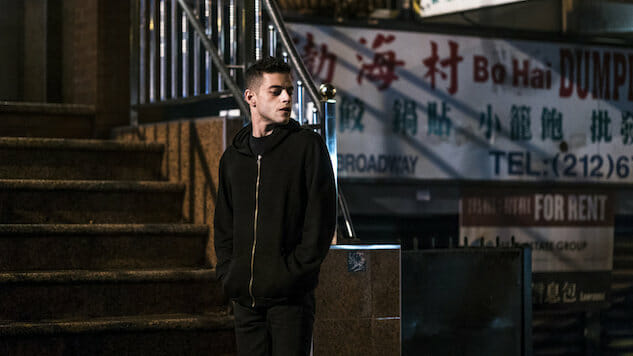Mr. Robot: Children of Men
(Episode 3.08)
Photo: Michael Parmelee/USA Network
If “eps3.4_runtime-err0r.r00” crystallized the streamlined shape of Mr. Robot’s third season, “eps3.5_kill-pr0cess.par2; elaborated on it, and last week’s Knight RiderslashBreaking Bad-inspired “eps3.6fredrick&tanya.chk” (R.I.P., Trenton and Mobley) suggested that even this tighter focus has limits, tonight’s episode, “eps3.7_dont-delete-me.ko,” unwraps the sentiment hidden in the side pocket of the season’s action and underscores it to superb effect. Bookended by more familiar features of Sam Esmail’s fictional universe—grief, regret, philosophical inquiries on the meaning of “deletion,” digital and analog—the heart of the hour is a sweet, surprisingly funny two-hander, a buddy comedy discovered on the edge of despair. It is, in its way, as unexpected a development in the series’ arc as the singular momentum of “runtime-err0r.r00,” in part because it’s a respite from Elliot’s (Rami Malek) inner monologue. For the space of an afternoon, Mr. Robot (Christian Slater) goes silent, because he and Elliot are one in the same.
Elliot meets Trenton’s brother, Mohammed (the exceptional Elisha Henig), when he attempts to pay his respects to she and Mobley three weeks after the Cyber Bombings. Despite being framed, along with her friend, for planning the attacks, Trenton’s father has no doubt that she’s innocent: “This country,” he says, “now blames Muslims for everything.” In a sense, this is no more comforting to Elliot than Mobley’s brother’s refusal to hear his assurances; he’s in search of closure, tying up loose ends as he prepares to take his own life, and neither exchange appears to satisfy his need to accept blame for all that’s transpired since 5/9, and before. He heads for the shore with his stash of morphine (“Life that unbearable, baby?” the lascivious dealer coos), ready for the plunge, when Mohammed sits down beside him. That gorgeous, wide-angle image of the ocean, their two tiny figures side-by-side on the sand, sets in motion one of the series’ warmest sequences to date, signaled by Mohammed’s retort when Elliot tries to shoo him away: “You don’t own the beach.”
Their trip to the movies to see Back to the Future—already glimpsed, in animated form, in the flashback that opens “kill-pr0cess.par2”—is a mirror image of the episode’s first sequence, down to Elliot advising Mohammed that mixing popcorn and candy is the only way to go. (There’s also, to Esmail’s credit, a swing at us wags that lands rather perfectly: Of the decision not to see The Martian, despite Mohammed’s mention of its Rotten Tomatoes score, Elliot comments dryly, “That’s because most critics have shitty taste.” I laughed out loud.) The difference, of course, is that Elliot, now the father figure, is gentler than Mr. Robot, and Mohammed is not nearly as petulant as young Elliot—it’s as if he’s gone back to the future, as it were, and written another ending. “Even if it was him, it was me,” Elliot says to Darlene (Carly Chaikin) in an earlier sequence, fearful that he’ll never escape his father’s grasp, but the one solution he hasn’t attempted is confronting the trauma of his childhood head-on. Note that Elliot, in the flashback, turns away from his father after he collapses in the cinema, while present-day Elliot chases after Mohammed when he disappears from the theater: In reversing the terms of his prior experience, our hero confirms that grief, regret, even deletion need not be permanent, or unchanging. He need not become his father, at least not in the way he’s learned to expect.
Perhaps this explains why Mohammed’s criticism of Elliot — “You know, you talk about yourself a lot” — is so bracing, and so telling. In his concern for the boy’s safety, Elliot is released, at least briefly, from that inner monologue, that haranguing voice, because he no longer has to play out the relationship as though he were just a kid; he has someone other than himself, or his selves, to talk about. And so, against the backdrop of makeshift memorials (“Remember the 71”) and fenced-in detention centers, against military patrols of trash-strewn streets—images that recall the fallen future of Alfonso Cuarón’s 2006 film Children of Men—Mr. Robot admirably (and, given its usually cool emotional register, unpredictably) sets gestures of understanding, of connection, of hope. Mohammed hands Elliot the lollipop. Elliot reaches out to Angela (Portia Doubleday) from the other side of her door. At the end of The War of the Worlds broadcast, “humans actually persevere.” As far as I can remember, this is as close to “touching” as Mr. Robot has come, as simple—and I mean this as a compliment—as that fan’s one-line gloss on Back to the Future. It may be true that one mistake can change the world, but if that’s the case, so can one kindness, with its reminder that we’re never as alone as we might begin to suspect.
No one owns the beach.
Matt Brennan is the TV editor of Paste Magazine. He tweets about what he’s watching @thefilmgoer.







































